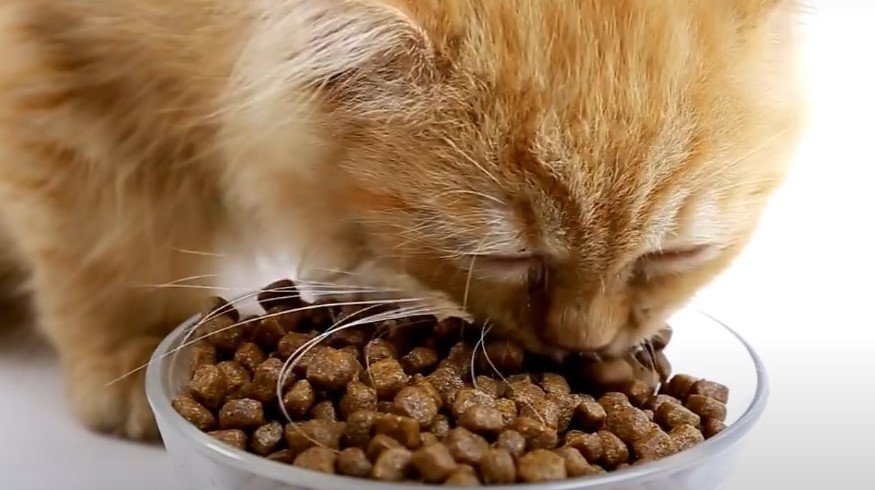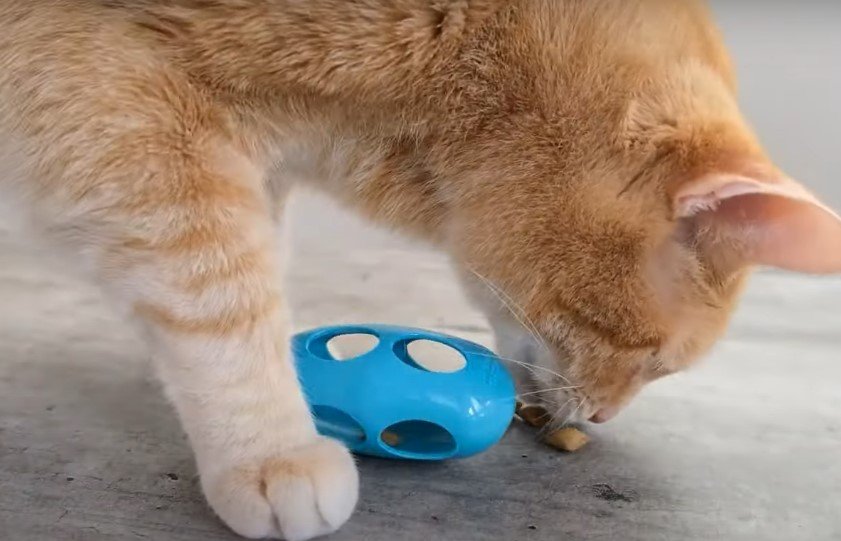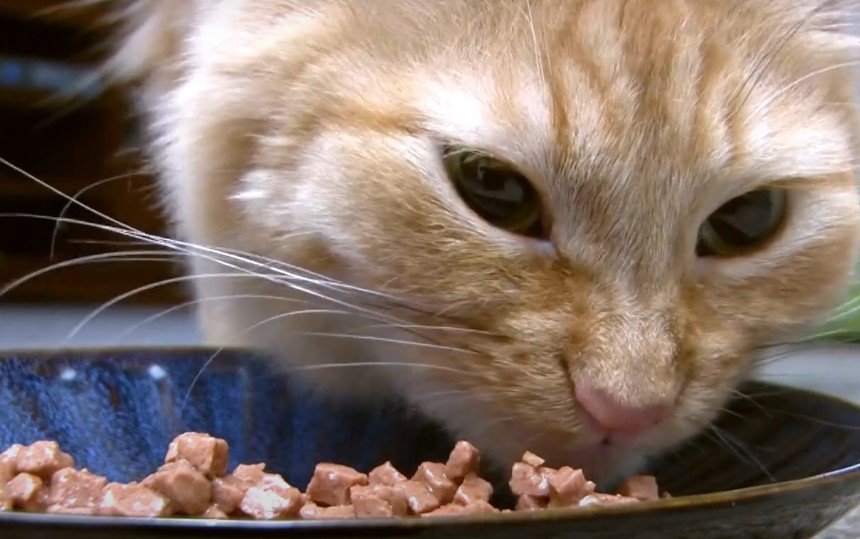
Can cats eat raw chicken safely, or is it too risky? Feeding raw chicken to cats is a controversial topic among vets and pet nutritionists. While raw chicken can provide protein and essential nutrients.
Keep reading to find out the potential risks, benefits, and vet-approved feeding tips to keep your feline friend safe.
Can Cats Eat Chicken?
Yes, cats can eat chicken, but it must be cooked properly. It is a great source of protein. Avoid seasoning like salt, garlic, onions, and spices, as they are toxic to cats. Plain, cooked (boiled or baked chicken without skin and bones), and unseasoned chicken offer lean protein and essential nutrients. These help keep cats’ muscles strong, their hearts healthy, and their immune systems strong.
However, only chicken is not a balanced diet. Cats need taurine, vitamins, and minerals from a complete diet. If you feed your cat chicken regularly, combine it with other nutrient-rich foods or a vet-recommended supplement.
Can Cats Eat Raw Chicken?
Yes, cats can eat raw chicken, but it comes with risks. As obligate carnivores, they must eat meat to stay healthy. However, raw chicken can carry harmful bacteria like Salmonella, E. coli, Campylobacter, and Listeria, which may cause bacterial infections and parasitic diseases like toxoplasmosis.
To reduce risks, ensure it is fresh, properly handled, and vet-approved. Always cook chicken properly and never feed seasoned, processed, or spoiled chicken
Risks of Feeding Raw Chicken to Cats
Many cat owners consider raw chicken a natural and nutritious option for their pets. However, while it can provide some benefits, there are significant risks that must be understood before adding raw chicken to a cat’s diet. These risks include bacterial contamination, parasites, nutritional deficiencies, bone hazards, and cross-contamination. Let’s explore these dangers in detail.
Bacterial Contamination
Raw chicken contains harmful bacteria like:
- Salmonella can cause severe digestive issues, including vomiting, diarrhea, and dehydration.
- E. coli – May lead to food poisoning and kidney problems.
- Campylobacter – Can cause intestinal inflammation and long-term digestive damage.
Cats may have a higher tolerance for bacteria than humans, but they are not immune. Infected cats can also spread bacteria through their saliva or feces, putting other pets and humans at risk. Young cats, senior cats, and those with weakened immune systems are especially vulnerable.
Parasites
Raw chicken can carry parasitic infections, which may cause digestive distress and long-term health problems. The most common parasites include:
- Toxoplasma gondii – Causes toxoplasmosis, leading to fever, lethargy, and neurological issues.
- Trichinella spiralis – A parasite that can invade muscle tissue, leading to pain and weakness.
- Roundworms and Tapeworms may cause weight loss, vomiting, and nutrient deficiencies.
While healthy adult cats can sometimes fight off minor parasitic infections, kittens are at higher risk of severe illness.
Nutritional Deficiency
A raw chicken-only diet lacks essential nutrients that cats need for long-term health. Raw chicken alone does not provide:
- Taurine – Essential for heart and eye health; deficiency can lead to heart disease and blindness.
- Calcium & Phosphorus – Needed for strong bones and teeth; imbalance can cause fractures and joint issues.
- Vitamin A – Supports vision, immunity, and skin health; deficiency leads to skin infections and poor eyesight.
- Omega Fatty Acids – Important for coat and skin health; a lack of these can result in a dull coat and itching.
Bone Pieces Can Be Dangerous
Many raw feeders recommend giving raw meaty bones to cats for dental health, but bones can also pose serious risks:
- Choking Hazard – Small bones, like chicken wing tips, can get stuck in the throat.
- Intestinal Blockages – If a cat swallows large, undigested bone fragments, it can cause severe blockages that require emergency surgery.
- Bone Splinters – Sharp bone fragments can puncture the stomach or intestines, leading to internal bleeding and infection.
Cooked bones are even more dangerous because they become brittle and break into sharp pieces that can injure a cat’s mouth, throat, or digestive tract.
Risk of Cross-Contamination
Handling raw chicken incorrectly can spread harmful bacteria to kitchen surfaces, other pet food bowls and water dishes, and your hands, clothes, and utensils. This increases the risk of human infection, especially for children, pregnant women, and individuals with weak immune systems.

Can Cats Get Sick from Eating Raw Chicken?
Yes, cats can get sick from eating chicken if it’s raw, contaminated, or not handled properly. Here are some symptoms to watch for:
Major Symptoms of Foodborne Illness in Cats after Eating Raw Chicken
- Vomiting
- Diarrhea (may contain blood)
- Lethargy & Weakness
- Loss of Appetite
- Dehydration (dry gums, sunken eyes)
- Fever
- Abdominal Pain (hunched posture, sensitivity)
How to safely prepare raw chicken for cats – Preventing Foodborne Illness
Feeding raw chicken to cats requires proper preparation to minimize health risks. Bacteria, parasites, and nutritional imbalances can harm your cat if the meat is not handled safely.
To safely feed raw chicken and prevent foodborne illness, follow these steps:
- Choose High-Quality Chicken – Use fresh, human-grade, antibiotic-free meat. Avoid expired, spoiled, or seasoned chicken.
- Store Properly – Refrigerate raw chicken at or below 40°F (4°C) and use within 1-2 days. Freeze at -4°F (-20°C) for 24+ hours to kill parasites. Always thaw frozen chicken in the refrigerator to keep it safe; never leave it out at room temperature.
- Prepare in a Clean Area – To prevent cross-contamination, always use separate utensils and cutting boards for raw meat. Wash your hands before and after handling raw chicken. Wash your hands thoroughly before and after touching raw chicken. Clean all surfaces with hot, soapy water or disinfectant after preparation.
- Cut into Proper Portions – Serve bite-sized pieces or soft, raw bones like chicken necks. Never feed cooked bones. Optional:
- If you want to make it easier for your cat to eat, use a meat grinder to process chicken with soft bones.
- This helps maintain the calcium-to-phosphorus ratio for a balanced diet.
- Balance Nutrition – Add organ meats (liver, heart, kidney), raw meaty bones, and supplements to prevent deficiencies.
- Serve Fresh & Monitor Health – Feed immediately or store in a sealed container for up to 24 hours. Watch for digestive issues or allergic reactions.
How Much Raw Chicken Can a Cat Eat?
The amount of raw chicken a cat can eat depends on age, weight, and activity level. Feed approximately 2-3% of your cat’s body weight in raw food daily. For example, a 10-pound (4.5 kg) cat would require about 90-135 grams of raw food per day. Kittens need more food per body weight, around 5-8%, as they grow.
Daily Raw Chicken Feeding Chart
| Cat’s Weight | Amount of Raw Chicken Per Day (2-4% of body weight) |
| 5 lbs (2.3 kg) | 1.6 – 3.2 oz (45 – 90g) |
| 8 lbs (3.6 kg) | 2.5 – 5 oz (70 – 140g) |
| 10 lbs (4.5 kg) | 3 – 6 oz (85 – 170g) |
| 12 lbs (5.4 kg) | 3.8 – 7.6 oz (110 – 215g) |
| 15 lbs (6.8 kg) | 5 – 10 oz (140 – 280g) |
Diet Composition: A balanced raw diet should consist of:
- 80% Muscle Meat: Provides essential proteins and amino acids.
- 10% Organ Meats: Such as liver and kidneys, supplying vital vitamins and minerals.
- 10% Edible Bone: Offers necessary calcium and phosphorus.
Raw Chicken for Cats: The Breakdown
Raw Chicken Breast Nutritional Stats for 100g
Raw chicken breast is a lean, high-protein food packed with essential nutrients. It is low in fat and carbs.
Below is the detailed nutrition profile of 100g of raw chicken breast:
| Nutrient | Amount per 100g |
| Calories (kcal) | 120 kcal |
| Protein | 22.5g |
| Fat | 2.6g |
| Carbohydrate | 0g |
| Fiber | 0g |
| Sugar | 0g |
| Sodium | 45mg |
| Calcium | 5mg |
| Phsphorus | 200mg |
| Zinc | 0.9mg |
| Potassium | 300mg |
| Iron | 0.4mg |
| Magnesium | 25mg |
Note: Values are approximate and can vary based on the source.
Pair chicken breast with fiber-rich vegetables and healthy fats for a balanced diet.
The Raw Chicken Diet and Weight Management
A raw chicken diet can support weight management when properly balanced. Rich in protein yet low in fat and carbohydrates, raw chicken helps maintain lean muscle, promoting healthy weight control and reducing the risk of digestive issues.
However, too much raw chicken can lead to weight gain, while too little may cause muscle loss, and feeding only raw chicken is not ideal. It lacks essential nutrients like taurine, vitamins, and minerals. For safe weight management, combine raw chicken with nutrient-rich ingredients like organ meats and bones.

Raw chicken for hydration
Raw chicken can help keep cats hydrated because it has a high moisture content—about 65-70% water. Unlike dogs, cats have a low thirst drive and get most of their water from food.
Cats that eat dry kibble often don’t drink enough water, leading to urinary tract issues and dehydration. Fresh, raw chicken provides natural fluids that support kidney function, digestion, and overall health.
If your cat is prone to dehydration, raw chicken isn’t enough. Add other moisture-rich foods like wet cat food or bone broth to your cat’s diet.
Can Cats Eat Raw Bacon?
No, cats should not eat raw bacon. While it comes from pork, which is a meat source, raw bacon contains high levels of fat and salt, which can be harmful to cats.
Raw bacon may carry bacteria like Salmonella or parasites that can make your cat sick. The high salt content can also lead to dehydration, high blood pressure, and kidney issues over time.
Even cooked bacon is not a healthy choice. It is still too salty and fatty, which can cause obesity, pancreatitis, and digestive problems in cats.
If your cat accidentally eats a small piece, it is usually not a major issue. However, monitor for vomiting, diarrhea, or lethargy and contact your vet if symptoms appear.
Can my cat eat raw chicken neck?
Yes, your cat can eat raw chicken necks. They are rich in protein, calcium, and essential minerals like magnesium, potassium, and phosphorus. Raw chicken necks also help clean your cat’s teeth by removing plaque and tartar.
However, raw chicken carries a risk of bacteria like Salmonella. So, handle it properly. Always feed raw, never cooked. If your cat has dental problems or trouble chewing, chop the neck into smaller pieces.
Can my cat eat raw chicken liver?
Yes, your cat can eat raw chicken liver, but not daily. Chicken liver is packed with essential nutrients that benefit your cat’s health. It is rich in vitamins A, B, and protein, which help boost immunity, maintain healthy skin and coat, and support vision.
This nutrient-dense organ meat also contains Coenzyme Q10 (CoQ10), a powerful antioxidant that protects cells, supports heart function, and enhances energy production. Additionally, chicken liver is a great source of choline, copper, and iron—nutrients that aid brain development, red blood cell production, and muscle function.
Most importantly, it provides taurine, an essential amino acid that cats cannot produce on their own. Taurine is vital for heart health, sharp vision, and proper digestion.
However, feeding liver daily can cause vitamin A toxicity, leading to bone problems, joint pain, and other health issues. So, offer it as an occasional treat, and for a balanced diet, it should be part of a proper raw or cooked meal plan.
Can Cats Eat Raw Chicken Fat?
Yes, cats can eat raw chicken fat, but it should be given in moderation. Fat is a natural energy source for cats, but too much can lead to health problems like obesity, digestive upset, and pancreatitis. Some cats may experience diarrhea or vomiting if they eat too much fat at once. Raw fat also carries a risk of bacterial contamination, just like raw meat. So, make sure it is fresh and avoid fat from processed or seasoned meat.
Can Cats Have Raw Chicken Breast?
Yes, cats can have raw chicken breast. Though raw chicken breast alone is not a complete diet. It is a great source of lean protein, providing essential amino acids and important minerals like potassium, magnesium, and selenium to support your cat’s health.
However, it can carry harmful bacteria, which may cause serious illness. So, it must be handled carefully. Choose fresh and small pieces. Avoid seasoning, marinades, or additives.
Can cats eat raw chicken bones?
Yes, cats can eat raw chicken bones, but only if they are small, soft, and fresh. Raw bones provide calcium, help clean teeth, and support digestion. Start with small pieces and observe how your cat handles them.
However, never feed cooked bones. They can break easily and splinter, which may lead to choking, internal injuries, or blockages. To keep your cat safe, always choose raw, meaty bones such as chicken wings or necks.
Can Cats Eat Raw Chicken Skin?
Cats can eat raw chicken skin, but it’s not the safest option. It is high in fat. Too much fat in a cat’s diet can cause obesity or pancreatitis. It has a higher chance of carrying harmful bacteria like Salmonella and E. coli, which can cause serious health problems.
If your cat eats raw chicken skin, offer it only in small amounts and as an occasional treat. Ensure it’s fresh and properly handled.
For a healthier option, stick to lean chicken meat and ensure your cat gets a balanced, nutrient-rich diet.
Do Cats Like the Taste of Raw Chicken?
Yes, most cats enjoy the taste of raw chicken because it’s fresh, meaty, and like their natural food. The texture and high protein content make it appealing. However, some cats may prefer cooked meat or other protein-rich foods instead. If you decide to offer raw chicken, introduce it slowly and watch for any negative reactions.

Conclusion
While cats can eat raw chicken, it poses risks such as bacterial infections, parasites, and potential nutritional imbalances. If you choose to feed raw chicken, ensure it’s fresh, properly stored, and part of a balanced diet with organ meats and bones. Always follow strict hygiene practices and consult a vet before making it a regular part of your cat’s diet.
FAQ
1. Can I feed my cat raw chicken every day?
Yes, you can give your cat raw chicken daily, but it should be part of a balanced diet. Raw chicken alone lacks essential nutrients like taurine, calcium, and omega fatty acids. To ensure proper nutrition, include 80% muscle meat, 10% organ meat, and 10% edible bone.
2. Is Raw Chicken Used in Commercial Cat Food?
Yes, raw chicken is used in commercial cat food, especially in raw, freeze-dried, and high-protein wet food formulas. Many premium brands include raw chicken as a primary ingredient because it’s high in protein and mimics a cat’s natural diet.
3. Is raw chicken part of a balanced diet for a cat?
Raw chicken alone does not provide all the necessary nutrients for your cat. It lacks essential nutrients like taurine, calcium, and certain vitamins. A complete raw diet must include muscle meat, organs, and edible bones in proper ratios. Always consult a veterinarian to ensure your cat’s diet is properly balanced.
4. Can kittens eat raw meat?
Kittens can eat raw meat, but it must be fresh, safe, and nutritionally complete. A raw diet for kittens must be nutritionally complete, and to reduce risks, it must be ensured that it is fresh, properly handled, and vet-approved.
5. What to Do If Your Cat Gets Sick from Eating Raw Chicken?
If your cat gets sick and experiences any issues like vomiting, diarrhea, or fever after eating raw chicken, stop feeding it immediately, make sure your cat stays hydrated, and consult a vet as soon as possible.

